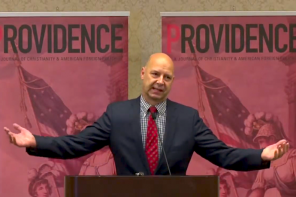My face-to-face connection to Sarah and Adam Walker Cleaveland is thin. Nonetheless, Sarah and I were “friends” on Facebook, which, in turn, linked me to Adam’s robust social media presence. So I was privy to the deep joy that surrounded the couple last fall as they celebrated the halfway mark of Sarah’s pregnancy with twin boys. I also learned almost immediately, it seemed, when the pregnancy came to a wrenching, premature end on October 25, 2010, and the couple lost their 19-week-old sons, Micah and Judah.
Through the afternoon of October 24th, and into the wee hours of the morning of the 25th, Adam had tweeted updates on Sarah’s status, requests for prayer, and his own anguished helplessness as Sarah delivered their premature babies, as they held them for their only hour-and-a-half of life, baptized them, and watched them fade away.
It is of course not possible that Adam’s 140-character prayers, pleas, and progress updates came close to expressing the weight of such an experience. And yet, as friends (and “followers”) shared prayers and expressions of compassion, it was clear that this connectedness mattered—the network was a kind of safety net. And, for my part, I was grateful, even in my very loose personal connection to them, to be aware of what was going on and to be able to hold them and their babies in my heart that day.
Banishing Technology
Adam and Sarah have been on my mind a great deal this week as I reflect on a very different social media experience: next weekend’s National Day of Unplugging, from sunset on March 4 to sunset on March 5—a day when “people across the nation will reclaim time, slow down their lives and reconnect with friends, family, the community, and themselves.” Reboot, the nonprofit sponsoring the event as part of their Sabbath Manifesto project, includes “Ten Principles” to guide participation: 1) Avoid technology; 2) Connect with loved ones; 3) Nurture your health; 4) Get outside; 5) Avoid commerce; 6) Light candles; 7) Drink wine; 8) Eat bread; 9) Find silence; 10) Give back. But, according the group’s website, the key principle of focus for the day is the avoidance of technology.
Tanya Schevitz, National Communications Coordinator for Reboot, however, makes clear that the nonprofit, which itself heavily leverages various online and social media technologies to communicate with and connect people, is not hostile toward technology. Indeed, Reboot will launch a National Day of Unplugging smartphone app on February 25 that will remind users to unplug and allow them to share “their own principles to develop a modern, personal interpretation of a day of rest.” Another Reboot project, 10Q, offers an online space for reflection during the ten days between the Jewish holidays of Rosh Hashanah and Yom Kippur, emailing participants questions for reflection each morning and sending all of their responses back to them on the eve of Rosh Hashanah the following year. They’re hardly Luddites, that is.
“The idea is to bring balance to the use of technology,” Schevitz explains. She continues, “The National Day of Unplugging is really about recognizing that it’s important to take a pause from technology—to reconnect to people who are all around us but who are basically lost in the noise of the relentless deluge of information.”
I hope we all can agree that taking time away from the frenzy of everyday life is a good thing. And pausing to reflect on the role of technology in our lives is important at a time when social technologies in particular are becoming increasingly integrated into daily life with effects that we are just beginning to describe and understand. But I do have to wonder if the keen, even if it’s not hostile, focus on technology as such misses the phenomenological, relational, and spiritual mark just a bit.
“A Spoon is Technology”
Devorah Schoenfeld, a scholar of Jewish history and theology at Loyola University Chicago, reinforces the value of connecting to family, friends, and community that is at the heart of Reboot’s Sabbath Manifesto project and the National Day of Unplugging. “These are interesting ways of making Sabbath more relevant for generations today,” she says. “They’re certainly perfectly acceptable ways of interpreting Jewish Shabbat traditions, and they’re available to Christians and other believers and non-believers as well.”
Schoenfeld, however, adds some nuancing on the role of technology in Sabbath practice as it traces to Jewish law and tradition. “There is no prohibition against using technology during the Sabbath,” she says, adding, “A spoon is technology. A pencil.” Schoenfeld goes on to explain that, the idea of turning off or unplugging from electric appliances on Shabbat is “kind of a modern quirk” related to the teaching in Torah that “you shall not kindle a fire in the home” on Sabbath (Ex. 35:3). Jewish authorities have held that electricity is like the spark that kindles a flame, and so it violates the spirit of Shabbat. But, says Schoenfeld,
There have always been technologies that have supported observance of Shabbat. People set timers to mark the start and stop of Sabbath. They use slow cookers to keep food warm through the day or put tape over the switch that keeps the light on in the refrigerator. Before there was electricity, hot stones or coals were used to keep food warm. So, the technology isn’t exactly the issue, at least as I see it in my own practice. It’s about observing the law as it’s set out in Torah, which has practical consequences that vary in different times and for different people.
For believers and non-believers who take some version or another of Sabbath practice seriously, the “practical consequences” to which Schoenfeld refers, and which Reboot encourages through the National Day of Unplugging, are very often heightened connection to people in our lives and to spiritual practices that can get short shrift in our work-a-day worlds. “Unplugging allows people to reconnect with the people who are all around us but are basically lost in the noise of the relentless deluge of information constantly comes at us every day on our smartphones and computers,” says Schevitz.
But this is not always the case. As Schoenfeld notes, “If you live in an isolated, rural area where there is not a Jewish community, not driving a car on Shabbat has a very different effect in terms of your connections to others than it does for someone in a city. That doesn’t mean you don’t observe the law, but that observance will mean different things in different places and times.”
Blaming Technology for a Human Failing?
Likewise, Muslim writer Pamela K. Taylor has described the spiritual significance of participating in prayer services online or via Skype for Muslims who are separated from active religious communities by geography, physical limitations, or other circumstances. Sun Dial: A Mobile Call to Prayer application available for the iPhone assists Muslims around the world in participating in daily prayer by tracking “the sun’s gentle movement through the sky.” According to the designers of the app, the image-focused technology is a particularly important spiritual aid for Muslims practicing in the United States, most of whom don’t speak Arabic and for whom the practice of Islam in a religiously diverse setting creates very different practical needs. Connecting to their faith and their communities is enhanced by the use of technology.
As in numerous of examples of a thoughtful, temperate use of technology, knee-jerk unplugging can, in fact, disconnect people from important relational and spiritual experiences. Indeed, as I noted in a recent article here on RD, for believers and non-believers alike there is a strong correlation between technological engagement and civic or spiritual engagement through volunteering—precisely the “giving back” that is such an important principle in Reboot’s Sabbath Manifesto that for the National Day of Unplugging they’ve partnered with the online service VolunteerMatch to help participants connect to local organizations who might need their assistance.
Assuming that “unplugging” necessarily makes us more connected or attentive to relationships with God, others and the rest of creation often seems to me, then, to blame technology for what is an essential human failing. Maybe your buzzing “crackberry” makes it easier to ignore your spouse, children, and friends, and to block of the needs of the world outside, but many a 1950s-model corporate dad seemed to manage that level of workaholic interpersonal distraction with only a newspaper and a neat cocktail after coming home late for dinner.
At the other end of the spectrum, fantasies that the application of new technologies to traditional practices will, in themselves, enrich life in general and spirituality in particular are no less misguided. Take a recent blog post on the U.S. Congregational Life Survey, which shared with italicized surprise the utterly unremarkable finding that “use of visual projection equipment in worship is not related to church growth.” No kidding? Survey says: a dull video or lame music is just dull as a preacher blah-blah-blah-ing on in person with no relational interest in or connection to the people to whom they are blab-casting. So, too, an engaging, interactive minister who genuinely connects to people and encourages their connection to one another is going to be compelling face-to-face and in technologically-enabled engagements (see, for example, @texasbishop, @MeredithGould, @jaweedkaleem).
Can You Hear Me Now?
At both ends of the continuum, then, advocates of cold-turkey unplugging and techno-wizardry in the context of worship and other spiritual practices can tend to make technology itself an idol. The former case, we are counseled to avert our eyes if we are to have any hope of seeing the divine in each other. In the latter, we are encouraged to bow down obediently if we are to have any hope of seeing each other in the spaces we have set apart for encounter with the divine.
At its very best, the National Day of Unplugging encourages reflection on the deeper meaning and value of our relationships with families, friends, our communities, the wider world of beauty and need, and whatever we might understand as God or the divine—however much these may or may not be enriched or diminished by our use of technology. In that sense, through it would be a tragically bad marketing move for Reboot, the event might better be named “The National Day of Connecting.” On such a day, as I see it, foundational practices would surely include the intentional powering off encouraged by Reboot. But there’s no reason it might not also include a digital retreat with the teachers of the online Buddhist community, Tricycle.
I would hope, too, that a day on which we attend to how we connect with others would involve appreciative reflection on the dozens and dozens of digitized expressions of prayer, compassion, and grief that unfolded across Twitter and Facebook as Sarah and Adam Walker Cleaveland connected through others known and unknown to them during a time of profound loss and as they continue to include such digital-enabled engagement in their healing.




